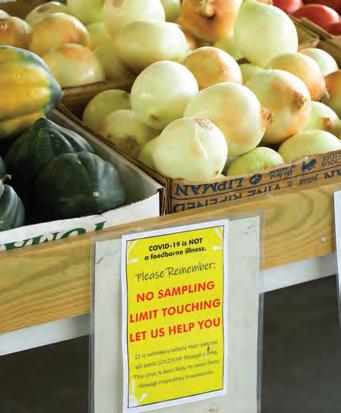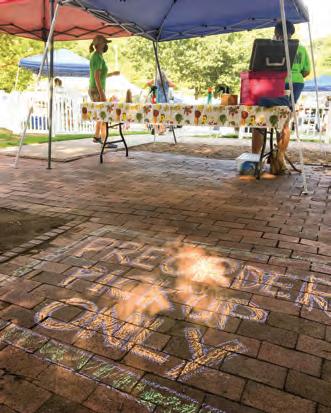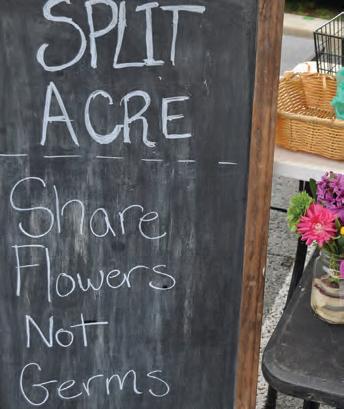
2 minute read
Viewpoints
from 2020-09-SYEMC
Farmers markets are adapting to serve communities during the pandemic
Story by Leah Chester-Davis | Photos by Randy Berger Photography unless otherwise noted
A cadre of volunteers, all wearing masks and matching T-shirts, are directing foot traffic on a sunny Saturday morning in late June at the Davidson Farmers Market. Arrows chalked on the sidewalk also provide direction toward a single entry point to the market. Only those who have pre-ordered and are wearing masks are allowed into the cordoned-off space. Social distancing reminders and directional guidelines help ensure the traffic flow through the market proceeds in a manner that prevents any congregating.
It’s a stark contrast from the pre-COVID lively market that drew the community together as folks shopped the numerous market stalls and chatted with neighbors and local farmers. This is the first day a small number of farmers are back at the market’s regular site. They plan to use this model for a couple of weeks before reopening the market. For the previous couple of months, farmers at this market had pivoted to a drivethrough model where customers pre-ordered and then drove through a designated area where farmers could simply load the produce, meat or other farm products into their customers’ cars with little contact.
Farmers markets are classified as essential businesses in the state, meaning they could remain open. Many, however, are overseen or regulated by municipalities, several of which closed markets or went to a drive-through or other model until safety protocols could be in place.
The Carrboro Farmers Market has remained open throughout the

pandemic, quickly implementing safe practices. Early on, the farmers market board turned to an expert for advice.
“We hosted an infectious disease specialist, Dr. Peter Gilligan from UNC, who is also a market regular. He provided us with a wealth of advice for how to safely operate and stay open,” says Market Manager Maggie Funkhouser.
“What he emphasized is now the script for the state and the country. Social distancing, keeping your hands clean, not touching your face, sanitizing surfaces a lot and not giving customers a reason to spend as much time at the market as they ordinarily would,” Maggie says. “We canceled all of our events and didn’t offer things like onsite, ready-to-eat foods. Most things are prepackaged now. We are not a pre-order market, but we encourage folks to pre-order and pre-pay whenever possible.”
They also reformatted the market and developed a one-way flow pattern. While socializing and milling around is a favored feature of most markets, Carrboro, along with most other markets, now encourage customers to “get in, get out and get home!”
The year round, state-run farmers markets in Raleigh, Greensboro, Charlotte and Asheville have remained open all along, though in early March they made significant modifications.
continued on page 12

Leah Chester-Davis


Carrboro Farmers Market






